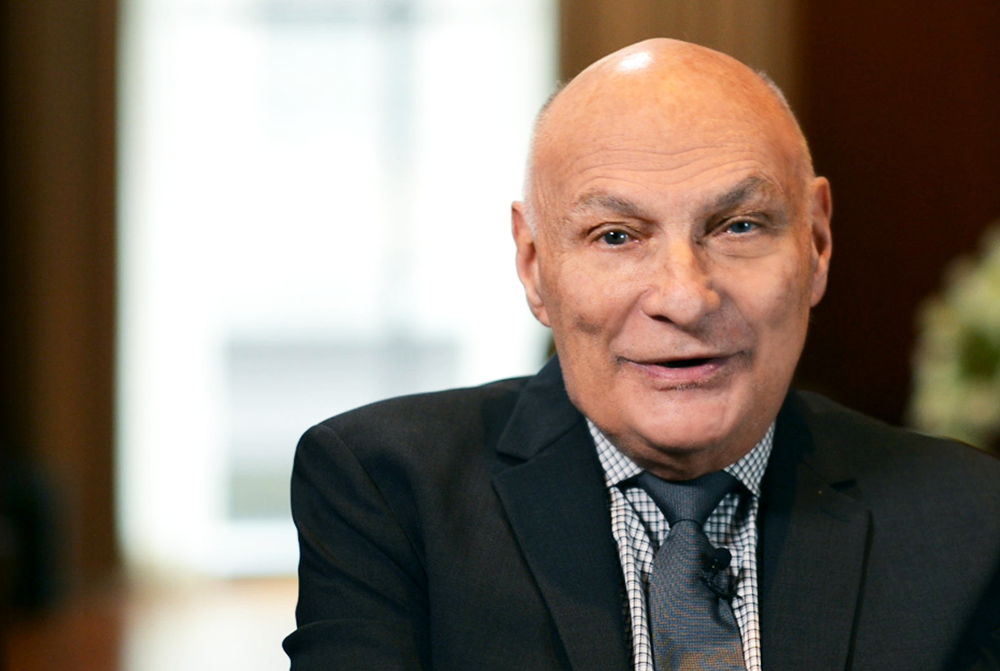Michael Kahn, former artistic director of the Shakespeare Theater Company, stressed the importance of diverse perspectives in the arts in his acceptance speech at a university honorary degree ceremony Tuesday.
Kahn served as the artistic director of the Shakespeare Theatre Company in Washington, D.C., from 1986 to 2019. Kahn received the honorary degree from University President John J. DeGioia (CAS ’79, GRD ’95), who recognized Kahn’s wide-ranging contributions to the theater world throughout his career. In 2000, Kahn founded The Shakespeare Theatre Academy for Classical Acting, a 12-month program where actors could intensively study Shakespeare and other classical dramatic texts.

Kahn’s work both at the theater company and in his other artistic endeavors highlights the life-changing influence of acting and production, DeGioia said at the ceremony.
“As an artistic director, as a teacher, as a director, as a mentor, Michael Kahn invites us and enables us to experience the transformative power of theater,” DeGioia said. “Over the course of his career, Michael Kahn has made it possible for thousands and thousands to engage in this process of transformation.”
In his acceptance speech, Kahn drew attention to the historic lack of diversity in the structure of the American theater 60 years ago, reading aloud the names of many playwrights from that time period.
“The writers I mentioned were all white males, as was the basic power structure of the American theater,” Kahn said.
The theater has since evolved to include a much more diverse cohort of artists, according to Kahn.
“The American theater is experiencing another golden age of playwrights,” Kahn said. “These are the voices of women, of people of color, of African Americans, Caribbean Americans, Asian Americans, of people who identify as LGBTQ or non-binary, children of immigrants or immigrants themselves, who have chosen to be heard in the theater of today.”
During his tenure as artistic director of the Shakespeare Theatre Company, Kahn also served as head of the drama division of the Juilliard School, a prestigious performing arts conservatory in New York City, from 1992 to 2006.
“I hope I earned whatever success, let me not leave out the many failures, and position of leadership in the Amerian theater through hard work, energy, thought, talent and yes, some vision,” Kahn said. “But I can see how my own white privilege gave me a pretty big leg up.”
While his work ethic and passion contributed to his accomplishments as an artistic director and educator, Kahn acknowledged the advantages he was afforded as a white man in the theater industry.
Participating in the arts contributes to human development in challenging people with different points of view and giving them the opportunity to reflect on the human condition, according to a 2019 Brookings study. Increases in arts learning can have a positive effect on the engagement of students in school and development of empathy with their peers, according to the study.
American theater will benefit from discussions that consider diversity in the context of the arts, Kahn said.
“These questions and conversations are essential to the continued health of the American theater,” Kahn said.
Beyond conversations about diversity, society should also address the troubling lack of art programs in schools, according to Kahn.
“There is a longer, and perhaps more important factor that needs to be recognized: the decades-long diminution and eventual elimination of the presence of art in education in our schools,” Kahn said.
Although activities such as sports can offer many of the same benefits as the arts as extracurriculars, the arts offer a distinct experience, according to Kahn.
“If you were in a play, and I love to be in a play, you have the chance to explore the lives of people from different backgrounds from yourself, with different problems and experiences than yours, and most important of all, to play someone other than yourself,” Kahn said.
The implementation of more art programs in schools not only will allow creativity to flourish among the younger generations, but also will help create a more equitable society, according to Kahn.
“To stand into others’ shoes, to be them, you had to dig deeper into the core of their circumstances and life choices, and in doing so you develop empathy, a quality much missing in our world,” Kahn said.




















